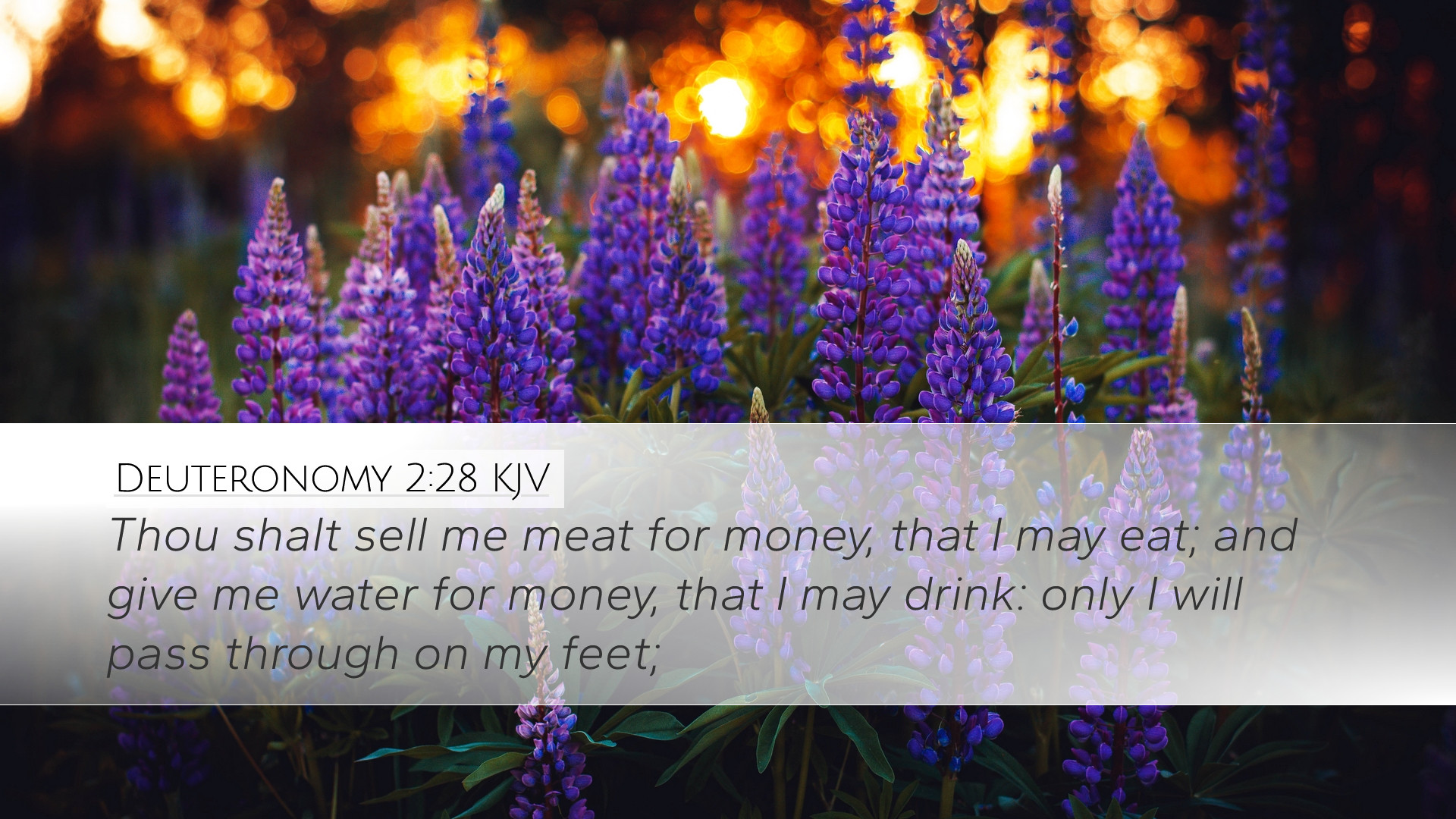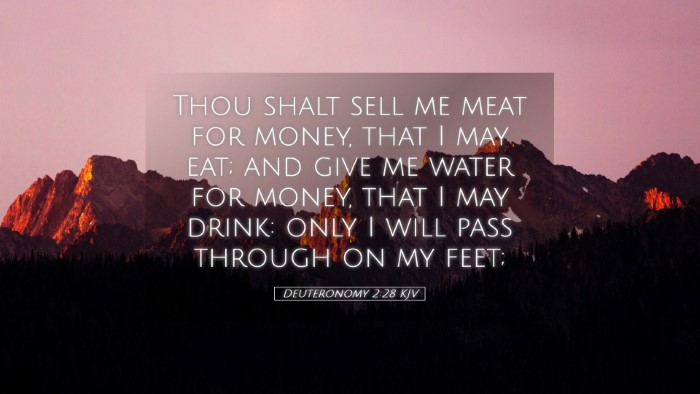Deuteronomy 2:28 Commentary
Verse Context: "Thou shalt sell me meat for money, that I may eat; and give me water for money, that I may drink: only I will pass through on my feet." This verse is situated within a narrative where Israel is making its way through the wilderness, seeking passage through the land of Edom.
General Overview
This request exemplifies the Israelites' approach to neighboring territories during their journey to the Promised Land. The request for provisions demonstrates a spirit of peaceful negotiation, contrasting with the often hostile encounters recorded in the historical books of the Old Testament.
Literary Aspect and Structure
Deuteronomy is structured as a series of speeches by Moses, emphasizing the importance of the Law. In chapters 1-3, Moses recounts the journey from Mount Sinai to the edge of the Promised Land. This particular request to Edom, the descendants of Esau, reflects a moment of potential peace and cooperation.
Key Themes
- Negotiation and Diplomacy: The verse highlights the necessity of interaction with other nations. Israel's request is respectful and offers payment in exchange for sustenance, indicating an intention to maintain good relations.
- Provision and Dependence: The narrative of Israel in the wilderness is underscored by their dependence on God for their needs. This request illustrates their reliance on both divine and human resources for survival.
- Unity in Diversity: The mention of Edom signifies the broader contexts of kinship and conflict, reminding readers that God’s purpose extends beyond Israel to encompass all nations.
Commentary Insights
Matthew Henry's Commentary
Matthew Henry emphasizes the idea of making efforts to peacefully traverse hostile lands. He notes that the Israelites intended to conduct themselves with integrity, offering payment instead of demanding provisions. This action is crucial in maintaining mutual respect among nations, echoing the broader theological point that God desires His people to be lights to the nations.
Albert Barnes's Commentary
Albert Barnes remarks that this approach exemplifies a lawful relationship between different peoples. His understanding of the text suggests that the Israelites demonstrate a model of humility and respect in their interactions with the Edomites. The request was made cordially, signifying that God’s people are not to wrangle or contend overtly but can negotiate for their needs amicably.
Adam Clarke's Commentary
Adam Clarke offers insights into the cultural and historical background of Edom, reminding readers of the familial ties between Israel and Edom (descendants of Abraham). He notes that this request underscores the importance of living in peace, particularly when neighboring nations are fundamentally connected through divine lineage. Clarke elaborates on the idea that the Israelites' approach reflects their journey toward understanding and reconciliation.
Theological Implications
This verse highlights several theological principles relevant for today’s church and its leaders:
- Peace and Reconciliation: The approach taken by the Israelites sets a precedent for modern interactions among communities and nations, advocating for peace and dialogue over conflict.
- Dependence on God: The recognition that all sustenance comes from God is vital for believers. This moment serves as a reminder to approach life with humility and gratitude.
- The Nature of God’s Covenantal Plan: The relationship with Edom complicates the narrative but also enriches it. It reminds readers that God's covenant extends beyond one nation and involves all of humanity.
Practical Applications
Pastors and theological students can draw several meaningful applications from this verse:
- Building Relationships: Encourage congregations to engage with surrounding communities in meaningful ways, promoting peace and cooperation.
- Fostering Generosity: Teach that giving and negotiating respectfully can lead to positive outcomes, even in challenging circumstances.
- Understanding History: Delve into the complexities of biblical relationships as a means to foster a deeper understanding of God’s overarching narrative.
Conclusion
The request made in Deuteronomy 2:28 serves not only a practical purpose for the Israelites but also encapsulates profound themes of diplomacy, divine provision, and the intricate relationships among God’s people. Pastors and scholars can draw rich insights from this simple yet powerful verse, urging both respect for others and the acknowledgment of God’s sovereignty in every encounter.


